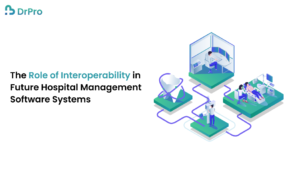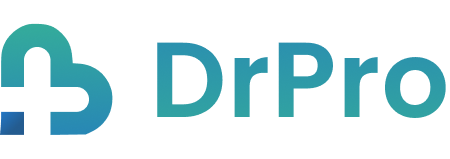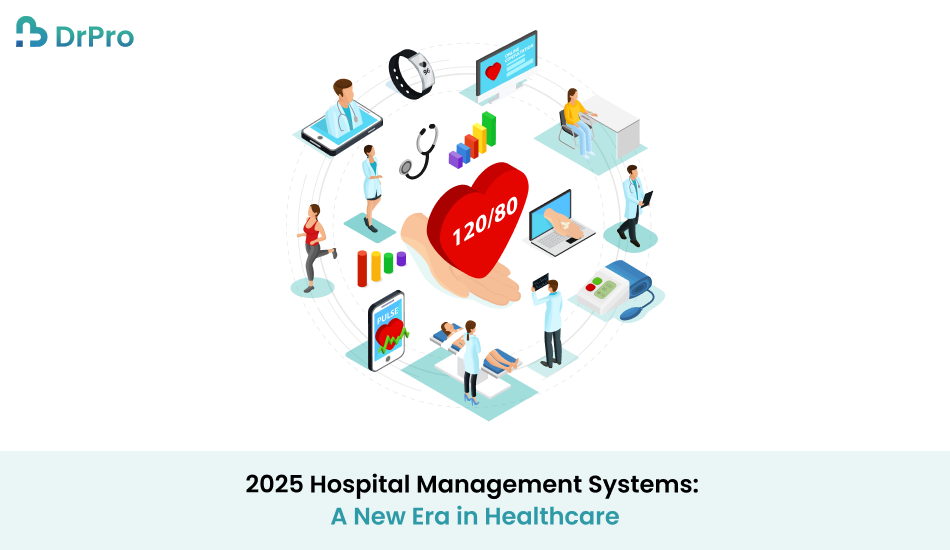Quick Summary
The healthcare field is perhaps the most dynamic and fast-growing one due to technological impacts. HMS has presently replaced the traditional Hospital Management Software System and plays a crucial role in improving hospital practices patient care and the integrated flow of work. Based on future trends for 2025, some of the key trends that will redefine the industry include; Artificial Intelligence (AI), cloud computing, and telemedicine. This article focuses on such advancements, challenges that are incumbent in adopting technology change, and how information systems like the DrPro Hospital Management Software System are propelling change in the healthcare industry.
Introduction
Hospital management systems or HMSs have been in use for quite some time now being the central platform to manage hospital information, appointments, invoicing, and supplies. They have become broadly developed in recent years and are currently used with highly enhancing technology that enhances possession and patient care. Therefore, by the beginning of 2025, HMS will add new functions and features to meet the new healthcare needs depending on the development of technological advancement. As we transition into this new generation of the hospital, the management software system will help improve the efficiency of processes and also bring about better patient interaction with healthcare services due to the increased convenience, accuracy, and cohesiveness of management systems.
In this article, dedicated to the key trends in HMS development, it will be suggested to focus on innovations making its future and discuss the strengths and weaknesses of hospitals that can implement high-grade HMS solutions like DrPro’s hospital management software system.
The Growing Importance of Hospital Management Systems
Hospital Management Software Systems are particularly necessary for arranging and even mechanically performing significant medical center processes. From a simple operational schedule, HMS has developed into complex systems that link several departments in a hospital; including admission, outpatient, billing, and even medical records department.
Bruce (2012) notes that healthcare systems have significantly grown complex resulting in their use in organizing large volumes of data. Hospital Management Software Systems aid in decongesting day-to-day functions, record keeping, and decision-making processes of a health facility. Besides, due to patient expectations regarding the increasing speed of the delivery of personalized health care, a stable HMS contributes to the continued competitiveness of hospitals in providing quality services.
With the progression of time, dynamic clinical requirements and changing regulatory environment escalate the operational challenges related to the provision of safe and efficient health services in 2025 and beyond. That explains why it becomes even more imperative to implement a sound HMS that can grow with emerging requirements around the technology.
Innovations Shaping the Future of Hospital Management Systems

The key themes for developing future innovations in hospital management systems are presented, and many innovations are changing the operation of a hospital. These advancements are not only enhancing work and business efficiencies but also enhancing patient care-related requirements. Below are some of the most profound changes anticipated to occur in HMS by 2025 with associated innovations.
AI and Analytics
Of all the available tools in modern healthcare, the prospects of which are the highest, it is possible to mention Artificial Intelligence and predictive analytics. When incorporated into the management of a hospital, these technologies minimize repetitive tasks, increase the quality of services to patients, and eliminate on likelihood of making wrong decisions.
Through AI, patient information can be used to forecast their health status, or to identify the presence of diseases and suggest their therapy. Resource planning is also facilitated through predictive analytics that can, for instance, give hospitals an idea of the number of patients to expect, the number of beds required, or nurses needed at a certain time. In addition, dynamic and incremental learning, thus the processing of extensive data sets, enables the constant enhancement of operational and decision-making procedures in a hospital.
AI-integrated Hospital Management Software Systems can also improve patients’ care as many health management problems are addressed with efficiency resulting in short waiting times, accurate diagnosis, and more efficient treatment plans hence increasing the patients’ well-being.
Cloud Technology Cyber Security
With the amount of data that is generated daily in the healthcare sector, cloud computing provides a central locus for medical data to reside. Delightful when implemented cloud-based hospital management software system provides many advantages such as flexibility, accessibility, and low costs. Through online servers and data storage, a huge amount of individual patient information could be stored safely in remote servers and could be accessed by medical practitioners at any time.
However, with the advent of cloud computing, the problem of security becomes critical. Having patients’ records exposed to cyber criminals is out of the question and therefore hospital management software systems must meet very high data protection standards. Encryption, user authentication, and periodic security assessment should be integrated to secure patients’ data and compliance with HC requirements as HIPAA.
Telemedicine Integration
Telemedicine has grown due to the COVID-19 pandemic and will play an increasing part in the coming years. Telemedicine implementation on hospital information systems enables consult and virtual follow-up of patients by their respective healthcare givers without necessarily visiting the hospital.
Integrating telemedicine into the HMS makes the system compatible with patients and providers in equal measure. As the process of remote patient care, telemedicine means not only the actual routine of the appointments’ scheduling and the means of secure data communication but also tightly integrated into the healthcare management software systems. Since telemedicine is gradually afoot to be part of healthcare services, HMS will also significantly contribute to its delivery by handling patients’ information and coordinating care in remote areas.
Internet of Things (IoT) in Healthcare
IoT stands for Internet or Internet of Things which means connected devices that can gather, transmit, and process data on a real-time basis. In this context, patients’ wearable sensors, smart monitors, and medical equipment in IoT are transforming existing and emerging healthcare facilities.
For example, patient monitoring systems connected to the HMS can use wires and technology that enables the health status of the patient to be recorded, raise alarms in case of abnormal readings, and offer real-time data to the healthcare givers. Such a stream of data enables more effective decision-making, faster reactions, and better outcomes for patients.
IoT will also be utilized in hospitals to extend competence in numerous areas including asset identification and tracking, equipment maintenance, and inventory management, minimizing the cost aspect too.
The Role of Interoperability in Future Hospital Management Software Systems

One of the most important capabilities to be expected of future Hospital Management Software Systems is interoperability – the capacity of the various healthcare systems to translate and exchange common data. Given that more and more hospitals use various systems for storing media records, managing patient care, and billing, the problem of data integration is especially pressing.
A very interoperable HMS ensures the patient information is transferred easily between the systems hence facilitating the quick decision making by the healthcare given. It decreases the possibility of repeated tests, it also minimizes the risks connected with mistakes being made in the calculation of the necessary doses. In the same way with better data sharing between providers, etc better coordinated care and thus better patient results will be achieved.
Patient-Centric Approaches in HMS
Patient-centered care is a model of delivery of health care services that puts much emphasis on the patient. It is found that current ECMs for Hospital Management Software Systems contain more patient-oriented trends to enhance the level of interaction, satisfaction, and overall care delivery.
Patient Portals
The application of a patient portal is a standard feature of present-day hospitals and their management systems. Such possibilities include the reviewing of personal health information, booking appointments, requesting prescriptions, or even using applications to consult with physicians. Patient portals foster patient participation, something crucial for their well-being while also decreasing the overall load on healthcare staff.
In the future, those portals are expected to be more interconnected with other HMS functionalities that include telemedicine and remote health evaluation to form a single, fully harmonized unified patient HM paradigm for ultimate patient convenience to clinicians and physicians.
Automation of Admin Work
The administrative works of billing, appointment scheduling, and patient registration generally are backbreaking and prone to making errors. Automation of these processes may help save time, reduce errors caused by human beings, and increase efficiency in terms of hospital management software systems.
In 2025, hospitals will increasingly rely on automated workflows to perform common administrative tasks so that it frees up staff to take care of more critical work to be done with the patients. Automation will also significantly improve data accuracy, resulting in timely billing, coding, and insurance claims being processed.
Challenges and Opportunities in Adopting Advanced HMS
The benefits of hospital management software systems are more than obvious, but implementation of these technologies faces multiple challenges for hospitals.
Data Security and Compliance
As the amount of healthcare data generated and stored is on the rise, so are the challenges of security and compliance. There are complex privacy laws like HIPAA and the corresponding need to ensure compliance from HMSs based on data protection standards.
Cost of Implementation
Advanced HMS can be a very expensive investment for a hospital, especially small ones. But the long-run efficiency, better patient care, and cost savings outweigh the initial costs.
Change Management
Implementing new management software in a hospital, therefore, calls for comprehensive planning and training. Changing the workflow of the staff will require healthcare professionals, and initially, the staff would react negatively to changes. For this reason, the challenges involved can be easily dealt with and transitioned into a system with proper training and support.
Using Our DrPro Hospital Management Software System
The DrPro’s Hospital Management Software System is an all-rounded solution for upgrading hospitals. It integrates all aspects of hospital departments including the management of patients’ registration and billing, inventory management, as well as telemedicine services. This makes DrPro the future-proof AI-based solution for hospitals by keeping them ahead of the curve of this more advanced digital landscape in healthcare.
DrPro makes it easy for a hospital to improve its procedures, reduce its administrative loads, and raise the standard of care rendered to the patients. Security features will safeguard the patients’ records, and it’s easy to use so personnel can easily get accustomed to it with less training time.
Conclusion
With time ahead to the year 2025, Hospital Management Software Systems will be playing much more essential roles in operating hospitals to efficiently deliver efficacy and high-quality care to the patients. Advanced AI, cloud technologies, and telemedicine together with the Internet of Things shall take shape toward the development of HMS toward becoming an ever more personalized and data-driven health system.
Hospital management software systems, at the front end, streamline the work procedures and, most importantly, open a space for the proper coordination of patient care to ensure the proper coordination of patient satisfaction. There will always be a challenge, yet the opportunity it delivers brings into its fold such management the brightest of futures.
With ProjectTree and DrPro working together, clients benefit from an integrated solution that bridges the gap between project management and medical practice
FAQs
Q1. What is a Hospital Management Software System (HMS)?
A Hospital Management Software System is a digital solution that automates and manages various hospital operations such as patient registration, billing, inventory management, and medical records.
Q2. How does AI improve hospital management?
AI enhances Hospital Management Software Systems by automating tasks, predicting patient outcomes, optimizing resource allocation, and improving diagnostic accuracy.
Q3. What role does cloud technology play in hospital management?
Cloud technology allows hospitals to store and access patient data remotely, improving flexibility, cost efficiency, and collaboration between healthcare providers.
Q4. How does telemedicine integration benefit hospital management?
Telemedicine integration enables remote consultations and monitoring, improving access to care and reducing patient wait times.
Q5. Why is patient-centric care important in Hospital Management Software Systems?
Hospital Management Software System Patient-centric care focuses on the needs and preferences of patients, leading to better engagement, satisfaction, and overall health outcomes.


